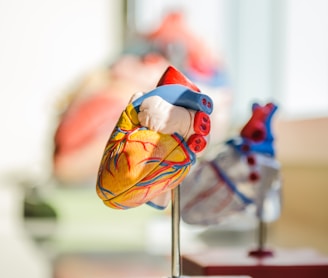Heart Health


Keep your Heart Health
By: Mikh | 10/11/2024
Keep Your Heart Good by Food: The Power of Nutrition for a Healthy Heart
The human heart is a powerful organ, tirelessly beating over 100,000 times a day to keep us alive. It delivers oxygen and nutrients to every cell in the body and removes waste products. But despite its vital role, the heart is vulnerable—especially to poor lifestyle habits. Among the most significant threats to heart health are poor diet, lack of physical activity, and stress. Fortunately, one of the most powerful tools to protect and strengthen your heart is food. Eating the right kinds of food can reduce your risk of heart disease, lower blood pressure, reduce inflammation, and keep your blood vessels flexible and clean. In this essay, we will explore how to keep your heart good by food, what to eat, what to avoid, and how simple daily choices can lead to a longer, healthier life.
Why Diet Matters for Heart Health
The foods we eat affect our body’s cholesterol levels, blood pressure, blood sugar, and inflammation—all of which influence the health of our heart. A diet rich in processed foods, sugar, unhealthy fats, and salt can increase the risk of heart attacks, stroke, and hypertension. On the other hand, a heart-friendly diet packed with nutrients, fiber, antioxidants, and healthy fats helps keep arteries clear, reduce bad cholesterol, and promote strong circulation.
Heart-Healthy Foods to Include in Your Diet
1. Fruits and Vegetables
Packed with vitamins, minerals, fiber, and antioxidants, fruits and vegetables help fight inflammation and control blood pressure.
Leafy greens like spinach, kale, and broccoli
Berries such as blueberries, strawberries, and raspberries
Citrus fruits like oranges and grapefruits
Tomatoes, rich in lycopene, which helps reduce LDL cholesterol
2. Whole Grains
Whole grains provide fiber, which helps reduce cholesterol levels and control blood sugar.
Brown rice
Oats
Quinoa
Barley
Whole wheat bread and pasta
3. Healthy Fats
Unsaturated fats help lower bad cholesterol and support good cholesterol.
Avocados
Nuts and seeds such as almonds, walnuts, chia seeds, and flaxseeds
Olive oil and canola oil
Fatty fish like salmon, sardines, and mackerel, rich in omega-3 fatty acids
4. Lean Proteins
Proteins are essential, but it is important to choose lean sources.
Fish and seafood
Skinless poultry
Legumes like lentils and chickpeas
Tofu and tempeh
5. Dark Chocolate
In moderation, dark chocolate (at least 70 percent cocoa) contains flavonoids that improve circulation and reduce blood pressure.
6. Green Tea
Green tea contains catechins, compounds that improve heart function and reduce cholesterol levels.
Foods to Avoid for a Healthy Heart
Just as some foods promote heart health, others can harm it. Limiting these can dramatically lower your risk of heart problems:
1. Processed Meats
Bacon, sausages, hot dogs, and salami are high in sodium and unhealthy fats.
2. Trans Fats and Hydrogenated Oils
Found in margarine, fried fast foods, and baked goods like cakes and cookies.
3. Excess Sugar
Soft drinks, candies, and sugary snacks can lead to weight gain, diabetes, and inflammation.
4. Excess Salt
Too much sodium raises blood pressure. Be cautious with canned soups, chips, and packaged sauces.
5. Refined Carbohydrates
White bread, white rice, and sugary cereals spike blood sugar and increase heart disease risk.
6. Alcohol
Excessive drinking weakens the heart muscle, raises blood pressure, and leads to irregular heartbeat.
The Importance of Water and Hydration
Staying well-hydrated is essential for heart health. Water helps your heart pump blood more easily through blood vessels and supports kidney function, which helps maintain healthy blood pressure. Avoid sugary beverages and opt for water, herbal teas, or naturally infused water with lemon or cucumber.
Eating Habits That Support a Healthy Heart
It is not just what you eat, but how and when you eat that affects your heart.
Portion control: Eating too much—even of healthy food—can lead to weight gain.
Regular meals: Skipping meals can lead to overeating and blood sugar spikes.
Mindful eating: Eat slowly, chew well, and avoid distractions while eating.
Limit late-night eating: Eating late can affect metabolism and blood pressure.
The Role of Cholesterol and Blood Pressure
A key goal of heart-healthy eating is to manage LDL cholesterol, triglycerides, and blood pressure. Soluble fiber (found in oats, beans, and apples) helps remove LDL cholesterol from the bloodstream. Potassium-rich foods like bananas and sweet potatoes help regulate blood pressure. Omega-3s reduce triglycerides and prevent blood clots.
Lifestyle Tips to Support a Heart-Healthy Diet
Combine diet with exercise: Aim for at least 30 minutes of physical activity most days.
Quit smoking: Tobacco damages blood vessels and increases heart attack risk.
Manage stress: Chronic stress increases blood pressure and encourages unhealthy eating habits.
Sleep well: Poor sleep is linked to high blood pressure and heart disease.
Cultural and Regional Diets That Support Heart Health
Some traditional diets around the world have been praised for promoting heart health:
Mediterranean Diet: Rich in olive oil, fish, vegetables, and whole grains
DASH Diet (Dietary Approaches to Stop Hypertension): Focuses on low sodium, fruits, and vegetables
Japanese Diet: Emphasizes fish, rice, vegetables, and green tea
Plant-Based Diets: Low in saturated fat and high in fiber
Conclusion: A Healthy Heart Begins on Your Plate
Your heart works hard every day. The best way to protect it is by feeding it the right nutrients. A healthy diet—rich in fruits, vegetables, whole grains, lean protein, and healthy fats—can prevent heart disease, lower cholesterol, manage blood pressure, and improve overall quality of life. Every bite you take is either helping or harming your heart. By making small, sustainable changes to your daily meals, you are taking powerful steps toward a longer, healthier life with a strong and steady heart.
Coming soon
We're on a mission ........................

Discover our full library of The Theos e-magazines and articles — all completely free to read.
We are a crowdfunded publication, dedicated to sharing knowledge, reflection, and theology with readers around the world.
Your support and donations help us continue offering open, accessible content for everyone, everywhere.
Join us in keeping wisdom free.
@ the theos since 2023 © 2023. All rights reserved.